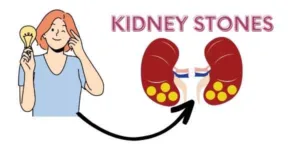+90 533 813 89 77
info@bookingforhealth.com

What Cause kidney stones?
In this informative article, we will try to find answers to the questions of what can cause kidney stones and kidney cancer. Below you can find the most frequently asked questions on this subject and our answers to these questions.
Which foods cause kidney stones?
Some foods can contribute to kidney stone formation. Foods high in oxalate, such as spinach, chocolate, nuts and beets, may increase the risk of calcium oxalate stones. Also, foods high in sodium, such as processed and fast foods, can lead to higher urinary calcium excretion, increasing the likelihood of calcium-based stones.
Does metformin cause kidney damage?
Metformin is a widely used medication to treat type 2 diabetes. It is generally considered safe for the kidneys, but caution is advised in individuals with pre-existing kidney conditions. Before prescribing metformin, healthcare professionals typically assess kidney function, and dosages may be adjusted accordingly to avoid potential kidney-related complications.
Does spinach cause kidney stones?
Spinach is high in oxalate, a naturally occurring substance that can contribute to calcium oxalate kidney stone formation. However, this does not mean that spinach is the sole cause of kidney stones. A well-balanced diet, moderate intake of high-oxalate foods, and sufficient hydration can help minimize the risk of stone formation.
Do kidney stones cause blood in urine?
Yes, kidney stones can cause blood in the urine, a condition known as hematuria. When a kidney stone moves within the urinary tract, it can cause irritation and minor injuries, leading to the presence of blood in the urine. However, it’s essential to consult a healthcare professional if blood in the urine is observed, as other medical conditions may also cause this symptom.
Do kidney stones cause constipation?
Kidney stones themselves do not cause constipation. However, the pain and discomfort associated with kidney stones may lead to changes in eating habits or decreased physical activity, which can contribute to constipation. Moreover, certain medications used to manage kidney stones or associated pain may have constipation as a side effect.
Does creatine cause kidney stones?
There is no strong evidence supporting a direct link between creatine supplementation and kidney stone formation. However, high doses of creatine may cause an increase in creatinine levels, which could put additional stress on the kidneys. Therefore, individuals considering creatine supplementation should consult with a healthcare professional and use the supplement as directed.
What food causes kidney stones?
Foods high in oxalate and sodium are known to increase the risk of kidney stone formation. Oxalate-rich foods, such as spinach, rhubarb, beets, nuts, chocolate, and certain teas, can contribute to the formation of calcium oxalate stones. Sodium-rich foods, particularly processed and fast foods, can increase the excretion of calcium in the urine, promoting the development of calcium-based stones.
Do kidney stones cause diarrhea?
Kidney stones do not directly cause diarrhea. However, the treatment of kidney stones or the use of certain medications, such as pain relievers or antibiotics, may result in gastrointestinal side effects, including diarrhea.
Do kidney stones cause bloating?
Kidney stones themselves do not directly cause bloating. However, the pain and discomfort associated with kidney stones may lead to changes in eating habits or reduced appetite, which can cause mild bloating as a secondary effect. Additionally, if a kidney stone causes a blockage in the urinary tract, it may lead to bloating and discomfort in the abdomen due to the accumulation of urine.
Do kidney stones cause UTI (urinary tract infection)?
Kidney stones can increase the risk of developing urinary tract infections (UTIs). When a kidney stone obstructs the flow of urine, bacteria may become trapped, leading to the development of a UTI. UTIs can cause symptoms such as frequent and painful urination, fever, and cloudy or bloody urine. Prompt medical attention is necessary to treat UTIs and prevent complications.
Does creatinine cause kidney stones?
Creatinine is not directly involved in the formation of kidney stones. It is a waste product produced by muscles and excreted by the kidneys. Elevated creatinine levels in the blood can indicate kidney dysfunction, but it is not a cause of kidney stone formation.
Does kidney disease cause itching?
Yes, kidney disease can lead to itching, a condition known as uremic pruritus. As kidney function declines, the body may have difficulty eliminating waste products, leading to a buildup of uremic toxins in the bloodstream. These toxins can irritate the skin and cause itching. Treating the underlying kidney disease and managing symptoms are crucial to alleviate itching.
Does vitamin C cause kidney stones?
Vitamin C, also known as ascorbic acid, is not inherently a cause of kidney stones when consumed in normal dietary amounts. However, large doses of vitamin C supplements may increase the excretion of oxalates in the urine, which can contribute to the formation of calcium oxalate kidney stones in susceptible individuals. It is advisable to avoid excessive vitamin C supplementation and consult a healthcare professional for proper dosage recommendations.
What blood pressure medications cause kidney failure?
Certain blood pressure medications, such as angiotensin-converting enzyme (ACE) inhibitors and angiotensin receptor blockers (ARBs), have been associated with kidney protection rather than causing kidney failure. These medications are often prescribed to manage high blood pressure and protect the kidneys in patients with conditions such as diabetes and chronic kidney disease.
Do kidney stones cause fever?
In some cases, kidney stones can cause fever, especially if they lead to a urinary tract infection. When a kidney stone obstructs the urinary tract, it may prevent normal urine flow, creating a stagnant environment where bacteria can thrive and cause infection. Fever, along with other symptoms like chills and flank pain, may indicate the presence of an infection and should be evaluated by a healthcare professional.
Do Tums cause kidney stones?
Tums, which contain calcium carbonate, are antacid medications used to relieve heartburn and indigestion. While Tums themselves do not cause kidney stones, their calcium content may contribute to stone formation in individuals susceptible to calcium-based stones. It is important to follow dosage recommendations and consult a healthcare professional if concerned about kidney stone risk.
Does carbonated water cause kidney stones?
Carbonated water itself is not directly associated with kidney stone formation. However, some flavored carbonated drinks may contain added sugars or other substances that can increase the risk of kidney stone development. Opting for plain, unflavored carbonated water or regular water can be a healthier choice for kidney health.
Does diabetes cause kidney failure?
Uncontrolled diabetes can lead to kidney damage over time, a condition known as diabetic nephropathy. High blood sugar levels can damage the blood vessels in the kidneys, impair their filtering function, and ultimately lead to kidney failure. Proper diabetes management, including blood sugar control and regular medical check-ups, is essential to prevent kidney complications.
Does stress cause kidney stones?
While stress itself may not directly cause kidney stone formation, it can lead to unhealthy lifestyle habits that may contribute to kidney stone risk. Stress may influence dietary choices, hydration levels, and overall well-being, which can indirectly affect kidney health. Managing stress through healthy coping mechanisms and self-care practices is beneficial for overall health and may indirectly help reduce kidney stone risk.



